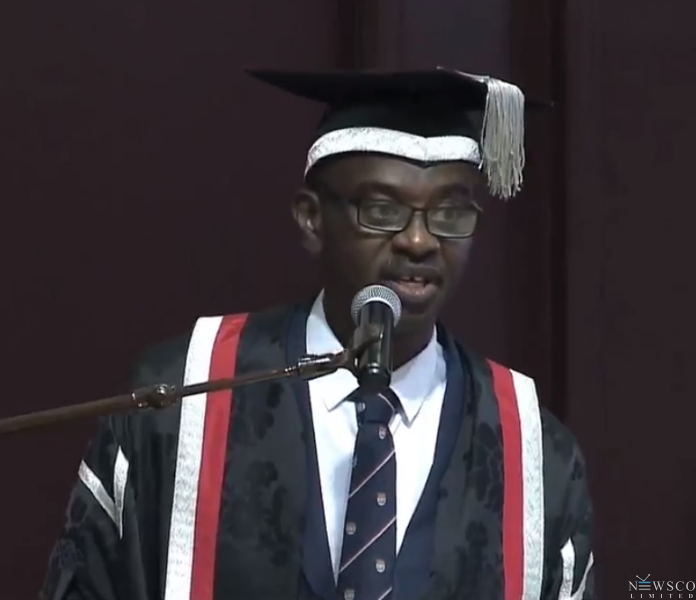By Robert A Emmanuel
Professor Justin Robinson has been formally inducted into the University of the West Indies as the new principal of the Five Islands campus.
At a ceremony at the St John’s House of Restoration Pentecostal Church, officials from the university, Governor of the Eastern Caribbean Central Bank, political leaders and persons within civil society came to congratulate the new principal.
UWI Five Islands Guild of Student President Cedrick Park gave congratulatory remarks on behalf of the Guild, stating that the Guild was ready to work with the new Principal to create a learning environment for the academic prosperity of students.
“We the students, are here to learn, to grow, to discover and to contribute to society and the world; we are here to pursue our dreams and aspirations, and to make a positive difference in the lives of others,” Park remarked.
A native of St Vincent and the Grenadines, and noted economist, Professor Robinson was approved to serve this three-year tenure last year, and will also serve as Pro Vice-Chancellor for Academic, Industry Partnerships and Planning.
Meanwhile, Vice Chancellor of the University, Sir Hilary Beckles, said that Professor Robinson was “profoundly suited to the task at hand” as the university has a “clear vision” for the next steps in the development of the fourth landed campus of the university.
Minister of Education Daryll Matthew also gave his congratulations to the new principal, hoping that Professor Robinson continues to help shape the regional education system.
“It is essential to recognise the significance of leadership in shaping the educational landscape, Professor Robinson brings with him a wealth of experience, a passion for education and a vision for the future that aligns seamlessly with the values that define our campus here in Antigua and Barbuda,” Minister Matthew expressed.
Professor Robinson, who thanked his family and closest supporters, noted that the university challenges the notion of elitism, and opens the door to equal access to opportunities for persons living within the Eastern Caribbean.
“Access to a world-class university education delivered by a Caribbean university, fully grounded in all of the contextual complexities of the Caribbean, I think is one of the most positive developments on our journey to date as a Caribbean civilization,” he said.
He noted that having a growing complement of educated and qualified professionals will build a “critical mass” of human resources needed to navigate the dynamic shifts in society.
He also said that having a university in the Eastern Caribbean provided greater focus on the Eastern Caribbean environment as a medium for economic, social, and scientific research, providing those societies access to localised solutions to the sub-region’s unique problems.
“Being present in a space, interacting with the people, the leaders focus your mind on the issues of that society, and to research them, which, despite your best intentions, you cannot do from a distance,” he explained.
He added that he saw his role as crafting a model, promoting financial sustainability at the university, calling on his UWI colleagues to support what he called the “revenue revolution” ensuring fair costing for regional governments and students, while maintaining the status of being a world-class institution.

